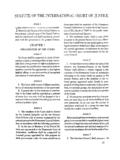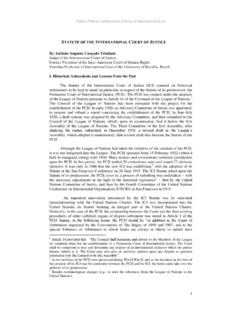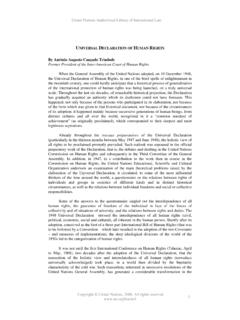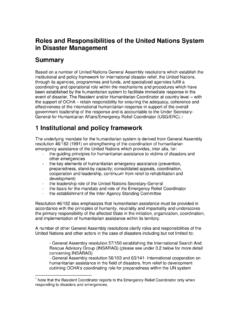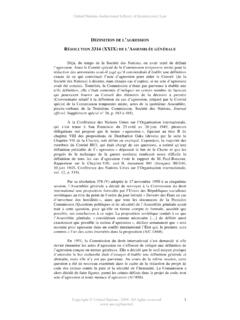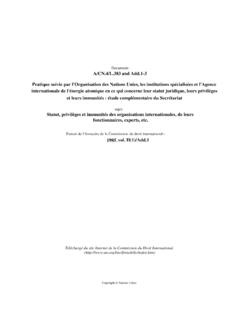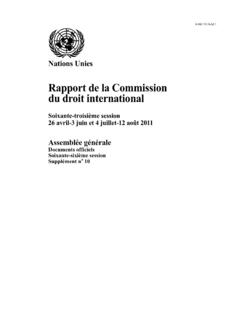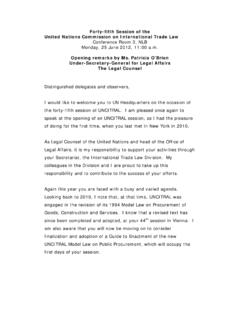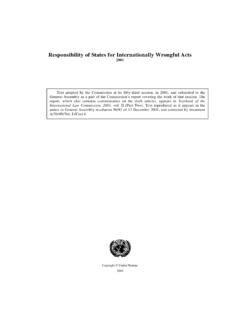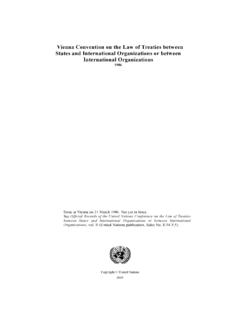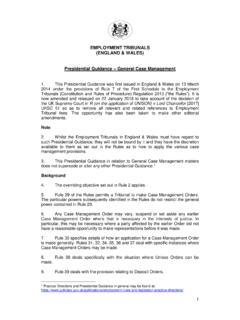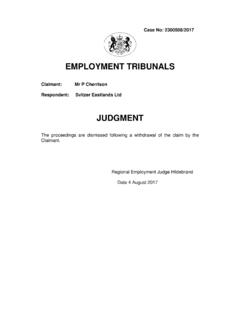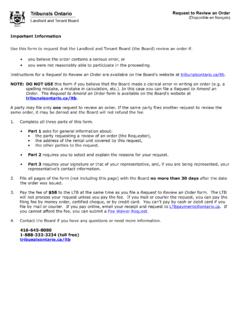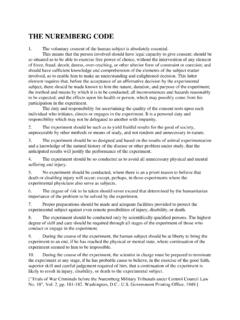Transcription of Vienna Convention on Consular Relations, 1963
1 Vienna Convention on Consular Relations1963 Done at Vienna on 24 April 1963. Entered into force on 19 March Nations, Treaty Series, vo1. 596, p. 261 Copyright United Nations20052 Vienna Convention on Consular RelationsDone at Vienna on 24 April 1963 The States Parties to the present Convention ,Recalling that Consular relations have been established between peoples since ancient times,Having in mind the Purposes and Principles of the Charter of the United Nations concerning thesovereign equality of States, the maintenance of international peace and security, and the promotion offriendly relations among nations.
2 Considering that the United Nations Conference on Diplomatic Intercourse and Immunitiesadopted the Vienna Convention on Diplomatic Relations which was opened for signature on 18 April1961,Believing that an international Convention on Consular relations, privileges and immunities wouldalso contribute to the development of friendly relations among nations, irrespective of their differingconstitutional and social systems,Realizing that the purpose of such privileges and immunities is not to benefit individuals but toensure the efficient performance of functions by Consular posts on behalf of their respective States,Affirming that the rules of customary international law continue to govern matters not expresslyregulated by the provisions of the present Convention ,Have agreed as follows:Article the purposes of the present Convention , the following expressions shall have the meaningshereunder assigned to them.
3 (a) Consular post means any consulate-general, consulate, vice-consulate or Consular agency;(b) Consular district means the area assigned to a Consular post for the exercise of consularfunctions;(c) head of Consular post means the person charged with the duty of acting in that capacity;(d) Consular officer means any person, including the head of a Consular post, entrusted in thatcapacity with the exercise of Consular functions;(e) Consular employee means any person employed in the administrative or technical service of aconsular post;3(f) member of the service staff means any person employed in the domestic service of a consularpost;(g) members of the Consular post means Consular officers, Consular employees and members of theservice staff;(h) members of the Consular staff means Consular officers, other than the head of a Consular post, Consular employees and members of the service staff.
4 (i) member of the private staff means a person who is employed exclusively in the private serviceof a member of the Consular post;(j) Consular premises means the buildings or parts of buildings and the land ancillary thereto,irrespective of ownership, used exclusively for the purposes of the Consular post;(k) Consular archives includes all the papers, documents, correspondence, books, films, tapes andregisters of the Consular post, together with the ciphers and codes, the card-indexes and any article offurniture intended for their protection or safe officers are of two categories, namely career Consular officers and honorary consularofficers.
5 The provisions of Chapter II of the present Convention apply to Consular posts headed by careerconsular officers, the provisions of Chapter III govern Consular posts headed by honorary particular status of members of the Consular posts who are nationals or permanent residentsof the receiving State is governed by article 71 of the present RELATIONS IN GENERALSECTION AND CONDUCT OF Consular RELATIONSA rticle 2 Establishment of Consular establishment of Consular relations between States takes place by mutual consent given to the establishment of diplomatic relations between two States implies, unlessotherwise stated.
6 Consent to the establishment of Consular severance of diplomatic relations shall not ipso facto involve the severance of 3 Exercise of Consular functionsConsular functions are exercised by Consular posts. They are also exercised by diplomaticmissions in accordance with the provisions of the present 4 Establishment of a Consular Consular post may be established in the territory of the receiving State only with that State seat of the Consular post, its classification and the Consular district shall be established bythe sending State and shall be subject to the approval of the receiving changes in the seat of the Consular post.
7 Its classification or the Consular districtmay be made by the sending State only with the consent of the receiving consent of the receiving State shall also be required if a consulate-general or a consulatedesires to open a vice-consulate or a Consular agency in a locality other than that in which it is prior express consent of the receiving State shall also be required for the opening of anoffice forming part of an existing Consular post elsewhere than at the seat 5 Consular functionsConsular functions consist in:(a)protecting in the receiving State the interests of the sending State and of its nationals, bothindividuals and bodies corporate, within the limits permitted by international law;(b)furthering the development of commercial, economic, cultural and scientific relations between thesending State and the receiving State and otherwise promoting friendly relations between them inaccordance with the provisions of the present Convention .
8 (c)ascertaining by all lawful means conditions and developments in the commercial, economic,cultural and scientific life of the receiving State, reporting thereon to the Government of the sendingState and giving information to persons interested;(d)issuing passports and travel documents to nationals of the sending State, and visas or appropriatedocuments to persons wishing to travel to the sending State;(e)helping and assisting nationals, both individuals and bodies corporate, of the sending State;5(f)acting as notary and civil registrar and in capacities of a similar kind, and performing certainfunctions of an administrative nature, provided that there is nothing contrary thereto in the laws andregulations of the receiving State;(g)safeguarding the interests of nationals, both individuals and bodies corporate, of the sendingStates in cases of succession mortis causa in the territory of the receiving State, in accordance with thelaws and regulations of the receiving State.
9 (h)safeguarding, within the limits imposed by the laws and regulations of the receiving State, theinterests of minors and other persons lacking full capacity who are nationals of the sending State,particularly where any guardianship or trusteeship is required with respect to such persons;(i)subject to the practices and procedures obtaining in the receiving State, representing or arrangingappropriate representation for nationals of the sending State before the tribunals and other authorities ofthe receiving State, for the purpose of obtaining, in accordance with the laws and regulations of thereceiving State, provisional measures for the preservation of the rights and interests of these nationals,where, because of absence or any other reason.
10 Such nationals are unable at the proper time to assumethe defence of their rights and interests;(j)transmitting judicial and extrajudicial documents or executing letters rogatory or commissions totake evidence for the courts of the sending State in accordance with international agreements in force or,in the absence of such international agreements, in any other manner compatible with the laws andregulations of the receiving State;(k)exercising rights of supervision and inspection provided for in the laws and regulations of thesending State in respect of vessels having the nationality of the sending State, and of aircraft registeredin that State, and in respect of their crews;(l)extending assistance to vessels and aircraft mentioned in subparagraph (k) of this article, and totheir crews, taking statements regarding the voyage of a vessel, examining and stamping the ship spapers, and, without prejudic
